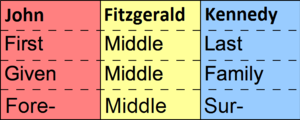
Back اسم شخصي Arabic Pangaran BCL ব্যক্তিগত নাম Bengali/Bangla Osobní jméno Czech Тулли ят CV Personnavn Danish Realname German Individua nomo Esperanto Kodanikunimi Estonian نام شخصی Persian
| Part of a series on |
| Linguistics |
|---|
|
|

A personal name, full name or prosoponym (from Ancient Greek prósōpon – person, and onoma –name)[1] is the set of names by which an individual person or animal is known. When taken together as a word-group, they all relate to that one individual.[2] In many cultures, the term is synonymous with the birth name or legal name of the individual. In linguistic classification, personal names are studied within a specific onomastic discipline, called anthroponymy.[3] As of 2023, aside from humans, dolphins and elephants have been known to use personal names.[citation needed]
In Western culture, nearly all individuals possess at least one given name (also known as a first name, forename, or Christian name), together with a surname (also known as a last name or family name). In the name "James Smith", for example, James is the first name and Smith is the surname. Surnames in the West generally indicate that the individual belongs to a family, a tribe, or a clan, although the exact relationships vary: they may be given at birth, taken upon adoption, changed upon marriage, and so on. Where there are two or more given names, typically only one (in English-speaking cultures usually the first) is used in normal speech.
Another naming convention that is used mainly in the Arabic culture and in different other areas across Africa and Asia is connecting the person's given name with a chain of names, starting with the name of the person's father and then the father's father and so on, usually ending with the family name (tribe or clan name). However, the legal full name of a person usually contains the first three names (given name, father's name, father's father's name) and the family name at the end, to limit the name in government-issued ID. Men's names and women's names are constructed using the same convention, and a person's name is not altered if they are married.[4]
Some cultures, including Western ones, also add (or once added) patronymics or matronymics, for instance as a middle name as with Pyotr Ilyich Tchaikovsky (whose father's given name was Ilya), or as a last name as with Björk Guðmundsdóttir (whose father is named Guðmundur) or Heiðar Helguson (whose mother was named Helga). Similar concepts are present in Eastern cultures. However, in some areas of the world, many people are known by a single name, and so are said to be mononymous. Still other cultures lack the concept of specific, fixed names designating people, either individually or collectively. Certain isolated tribes, such as the Machiguenga of the Amazon, do not use personal names.[i]
A person's personal name is usually their full legal name; however, some people use only part of their full legal name, a title, nickname, pseudonym or other chosen name that is different from their legal name, and reserve their legal name for legal and administrative purposes.
It is nearly universal for people to have names; the United Nations Convention on the Rights of the Child declares that a child has the right to a name from birth.[7]
- ^ Keats-Rohan 2007, p. 164-165.
- ^ Room 1996, p. 79.
- ^ Room 1996, p. 8.
- ^ Notzon, Beth; Nesom, Gayle (February 2005). "The Arabic Naming System" (PDF). Science Editor. 28 (1): 20–21. Archived from the original (PDF) on 30 September 2022.
- ^ Snell, Wayne W. (1964). Kinship relations in Machiguenga. Hartford Seminary Foundation. pp. 17–25.
- ^ Johnson, Allen W. (2003). Families of the forest: the Matsigenka Indians of the Peruvian Amazon. University of California Press. pp. 9–10. ISBN 978-0-520-23242-6.
- ^ Text of the Convention on the Rights of the Child Archived 13 January 2015 at the Wayback Machine, Adopted and opened for signature, ratification and accession by General Assembly resolution 44/25 of 20 November 1989 entry into force 2 September 1990, in accordance with article 49, Office of the United Nations High Commissioner for Human Rights.
Cite error: There are <ref group=lower-roman> tags or {{efn-lr}} templates on this page, but the references will not show without a {{reflist|group=lower-roman}} template or {{notelist-lr}} template (see the help page).